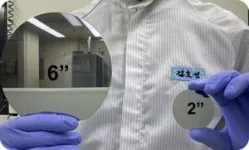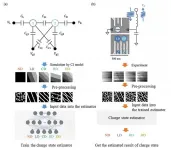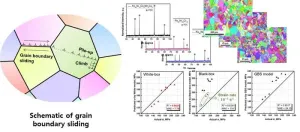(Press-News.org) LOS ANGELES — Physician scientists from City of Hope, one of the largest cancer research and treatment organizations in the United States, found that people with metastatic kidney cancer who orally took a live biotherapeutic product called CBM588 while in treatment with immunotherapy and enzymatic tyrosine kinase inhibitors experienced improved health outcomes. The phase 1 trial was published today in Nature Medicine.
Microorganisms in the gut modulate the immune system. City of Hope researchers are now in discussions with the global SWOG Cancer Research Network to design a phase 2/3 trial to assess the City of Hope-identified novel use of CBM588 and microbiome modulation in people with advanced cancer. Sumanta Pal, M.D., professor and vice chair of academic affairs in City of Hope’s Department of Medical Oncology & Therapeutics Research, is slated to be co-leader of the potential phase 2/3 SWOG trial.
“We at City of Hope are the first to demonstrate a live bacterial product’s ability to improve clinical outcomes for patients with kidney cancer treated with immunotherapy. CBM588 could be exciting in cancer treatment because of its potential to enhance the efficacy of immune checkpoint inhibitor-based treatment, improve patient outcomes and modulate the gut microbiota in beneficial ways,” said Pal, a City of Hope medical oncologist and corresponding author of the new study. “Ongoing and larger clinical trials are crucial to validate these benefits and address current challenges. If the positive results observed in this small trial and a previous trial with nivolumab and ipilimumab are confirmed, CBM588 could become a valuable supplement in the treatment of various cancers, particularly for patients treated with immune checkpoint inhibitors."
An estimated 44% of U.S. patients with cancer in 2018 were eligible for checkpoint inhibitor drugs, according to a JAMA Network Open article that flags the increasing trend of this percentage.
In the single-center, phase 1 trial, 30 people with metastatic kidney cancer were randomized to receive cabozantinib, an inhibitor of vascular endothelial growth factor receptor, and targeted immunotherapy nivolumab with or without CBM588 as first-line treatment. Participants’ gut microbiome were analyzed via stool samples in the beginning for a baseline and then 13 weeks into treatment.
City of Hope has granted an exclusive worldwide license to Osel for intellectual property on the novel use of CBM588 to enhance the efficacy of checkpoint inhibitors used to treat cancer, including metastatic renal cell carcinoma. Scientists from Osel and Miyarisan Pharmaceutical Co. Ltd, the manufacturer of CBM588, collaborated on the study.
To date, many studies on lung cancer, melanoma and metastatic kidney cancer, among other diseases, have shown that the composition of the gut microbiome could predict immunotherapy outcomes for patients with cancer. Current guidelines for metastatic renal cell carcinoma (kidney cancer) recommend that newly diagnosed patients receive either dual checkpoint inhibitor therapy or a combination of immunotherapy and tyrosine kinase inhibitor, but most patients eventually experience disease progression while on treatment. Positive patient outcomes usually do not last, and subsequent treatments are largely palliative rather than curative. So, physician scientists are looking to combine current strategies with new treatments that do not introduce toxic side effects, such as through microbiome modulation.
In the trial, City of Hope researchers observed an increase in the abundance of unclassified Ruminococcaceae genera, which has been linked with improved clinical outcomes with immune checkpoint inhibitors in recent studies. Clostridium butyricum MIYAIRI 588, the bacterium in CBM588, produces butyric acid, which is critical for intestinal health and is a well-known immunomodulator.
"While not yet part of standard cancer treatment protocols, microbiome modulation is a promising area of research with the potential to enhance the efficacy of cancer therapies, particularly immunotherapies. Current applications are primarily within clinical trials, but the growing body of evidence suggests that microbiome-based interventions may soon become a valuable component of cancer treatment strategies,” said Hedyeh Ebrahimi, M.D, M.P.H., City of Hope postdoctoral medical oncology fellow and first author of the study.
City of Hope is accelerating its research on the direct link between a healthy gut and the effectiveness of immune therapies, such as CAR T cell therapy. Its enhanced microbiome program spans from basic to clinical research and includes studying the gut microbiome’s role in protecting transplant patients from complications experienced during their recovery.
“This study demonstrates again that the microbiome has an important role in the efficacy and toxicity of cancer immunotherapy and can be targeted to improve outcome,” said Marcel van den Brink, M.D., Ph.D., president of City of Hope Los Angeles and City of Hope National Medical Center, and the Deana and Steve Campbell Chief Physician Executive Distinguished Chair.
# # #
The Nature Medicine study entitled “Cabozantinib and nivolumab with or without live bacterial supplementation in metastatic renal cell carcinoma: a randomized phase 1 trial” was supported by Exelixis Inc. (XL184-IST123). CBM588 was supplied by Miyarisan Pharmaceutical Co., Ltd. and Osel Inc.
About City of Hope
City of Hope's mission is to make hope a reality for all touched by cancer and diabetes. Founded in 1913, City of Hope has grown into one of the largest cancer research and treatment organizations in the U.S. and one of the leading research centers for diabetes and other life-threatening illnesses. City of Hope research has been the basis for numerous breakthrough cancer medicines, as well as human synthetic insulin and monoclonal antibodies. With an independent, National Cancer Institute-designated comprehensive cancer center at its core, City of Hope brings a uniquely integrated model to patients spanning cancer care, research and development, academics and training, and innovation initiatives. City of Hope’s growing national system includes its Los Angeles campus, a network of clinical care locations across Southern California, a new cancer center in Orange County, California, and cancer treatment centers and outpatient facilities in the Atlanta, Chicago and Phoenix areas. City of Hope’s affiliated group of organizations includes Translational Genomics Research Institute and AccessHopeTM. For more information about City of Hope, follow us on Facebook, X, YouTube, Instagram and LinkedIn.
END
Seismic signals have suggested Mars gets hit by around 300 basketball-sized meteorites every year, providing a new tool for dating planetary surfaces.
The new research, led by scientists at Imperial College London and ETH Zurich working as part of NASA's InSight mission, has shed light on how often ‘marsquakes’ caused by meteorite impacts occur on Mars.
The researchers found that Mars experiences around 280 to 360 meteorite impacts every year that produce craters larger than eight metres in diameter and shake the red planet’s ...
A new study brings fresh revelations about the connection between early-life exposure to air pollution and lung health later in life. A research team led by the Keck School of Medicine of USC has shown that exposure to air pollution during childhood is directly associated with bronchitis symptoms as an adult.
To date, many investigations in the field have established intuitive links that are less direct than that: Air pollution exposure while young is consistently associated with lung problems during childhood — and childhood lung problems are consistently associated with lung issues as an adult.
The current study, published in the American Journal of Respiratory ...
Children learn much about self-regulation – that is affective, mental, and behavioral responses to certain situations – during their first few years of life. Some of these behaviors are about children’s ability to choose a deliberate response over an automatic one. This is known as effortful control, which is learned from the environment, first and foremost through children’s relationship with their parents.
In recent years, giving children digital devices to control their responses to emotions, especially if they’re negative, has ...
A new legal requirement for developers to demonstrate a biodiversity boost in planning applications could make a more meaningful impact on nature recovery if improvements are made to the way nature’s value is calculated, say researchers at the University of Cambridge.
From 2024, the UK’s Environment Act requires planning applications to demonstrate an overall biodiversity net gain of at least 10% as calculated using a new statutory biodiversity metric.
The researchers trialled the metric by using it to calculate the biodiversity value of 24 sites across England. These sites have all been monitored over the long-term, allowing the team to compare biodiversity ...
A group of researchers has successfully demonstrated automatic charge state recognition in quantum dot devices using machine learning techniques, representing a significant step towards automating the preparation and tuning of quantum bits (qubits) for quantum information processing.
Semiconductor qubits use semiconductor materials to create quantum bits. These materials are common in traditional electronics, making them integrable with conventional semiconductor technology. This compatibility is why scientists consider them strong candidates for future ...
A research team led by Professor Hyoung Seop Kim from the Graduate Institute of Ferrous & Eco Materials Technology and the Department of Materials Science and Engineering and Jeong Ah Lee, a PhD candidate, from the Department of Materials Science and Engineering, in recent collaboration with Professor Figueiredo from Universidade Federal de Minas Gerais's Department of Metallurgical and Materials Engineering in Brazil, has developed an optimal artificial intelligence model to predict the yield strength of various metals, effectively addressing traditional cost and time limitations. This research has been published in the online edition of Acta Materialia, an ...
The results of the longitudinal study “Prognostic value of tissue bridges in cervical spinal cord injury” have the potential to change clinical practice. They have just been published in The Lancet Neurology, the world’s leading journal of clinical neurology. The team led by lead author Dr. Dario Pfyffer and senior author Prof. Dr. med. Patrick Freund from Balgrist University Hospital and the University of Zurich, which includes SCI experts from around the world, has successfully developed models that incorporate tissue bridges in the spinal cord in a large, multicenter cohort of patients with cervical SCI for improved prognosis of clinical outcomes. These ...
Several indicative factors, including junior rank, male sex, and younger age, are strongly linked to ‘harmful gambling’ among serving UK military personnel, finds an analysis of survey responses, published online in the journal BMJ Military Health.
Harmful gambling refers to the toll taken on finances, health, personal relationships, and work: nearly 1 in 4 respondents reported one or other of these effects over the past year.
The findings prompt the researchers to call for the prioritisation of better, earlier, and targeted support to stave off the harmful consequences of ...
A lower level of mental ability during the teenage years may be linked to as much as a tripling in the risk of having a stroke before the age of 50, finds research published online in the Journal of Epidemiology & Community Health.
The observed associations held true even after factoring in current diabetes and limiting the age of a first stroke up to 40, prompting the researchers to suggest that more comprehensive assessments beyond traditional stroke risk factors are now needed to stave off disability and death.
Recent evidence suggests that cases of stroke ...
Children conceived by using egg or sperm donors have the same well-being outcomes as non-donor conceived people.
However, they are more likely to have identity difficulties and issues with trust. Secrecy and anonymity about their genetic parentage can have a profound impact on well-being say authors. They warn that children and adults conceived using donor gametes have not been centred in the assisted reproductive industry and more information is needed about adult wellbeing.
The study is published today in the British Journal of Obstetrics and Gynaecology by researchers King’s College London. The study is the first systematic ...






